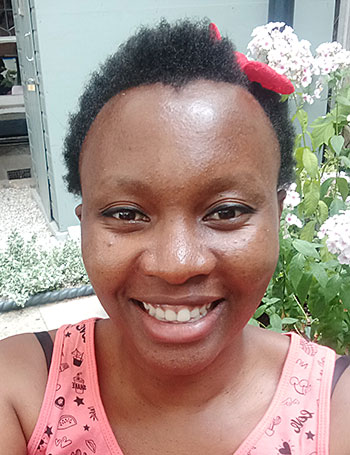
Makena Onjerika ’10
Makena Onjerika ’10 is the author of “Fanta Blackcurrant,” which won the 2018 Caine Prize for African Writing, given annually to an African writer of a short story published in English. Onjerika majored in economics at Amherst and received her M.F.A. in creative writing from New York University. “Fanta Blackcurrant,” published in Wasafiri, follows Meri, a street child in the author’s home city of Nairobi, Kenya.
Why did you study economics?
Most people at Amherst thought I was an English major. I wish I had double majored in English and economics, actually. My one regret in life. When I started at Amherst, I was very much interested in issues around development and felt that economics would help me understand why my country seemed trapped in perpetual underdevelopment. However, I don’t think I was any good at economics, despite passing my exams.
Why did you start writing fiction?
Writing was an escape from my utterly soul-numbing secondary school experience. The Kenyan education system is exams-focused, and a lot of what we did in class was memorizing concepts without really understanding them. I wanted to do something that made me feel alive. I pursued writing through classes with Judith Frank, Alexander Chee and Rhoda Cobham-Sander. They fixed up a lot of my writing, from things as basics as grammar to concepts as headache-inducing as plot and voice.
What are some career highlights and challenges?
Learning the rules of writing has made me a stronger writer, but it has also made me unable to write at times. After my M.F.A., I stopped writing for five years. There was no longer any pleasure in it for me. Only continuous self-doubt, self-editing and debilitating perfectionism. Getting back to writing has taken a lot of work. Even now, I have to fight and coax myself into writing “shitty first drafts,” as Anne Lamott calls them in her book Bird by Bird. One of the ways I do this is writing on WhatsApp to my group of writing friends.
“Fanta Blackcurrant” portrays homelessness in Nairobi. Why have readers responded to strongly to your main character, Meri?
Perhaps for the same reasons I am drawn to her. She refuses to be defeated. She is determined to see things her own way. She keeps getting up.
How would you describe your writing process?
Thinking is the enemy of good story, at least in the beginning. Once I have a first draft, things become more leisurely, like cooking a meal that does not come with a recipe. I keep tasting, adding this, adding that, diluting this, expunging that, until it’s just right. Sometimes it’s necessary to throw out the whole thing. The story changes, definitely, because the story is me, and I am changing all the time.
The Caine judges praised you for “a narrative forged but not defined by the streets of Nairobi, a story that stands as more than just witness.” What was it like to hear that?
Surprising, because I feel my way through stories, using intuition and my inner ear to determine how each needs to develop. I have long given up on such concepts as themes, symbolism and even meaning. My job is putting words on paper (or computer). Those who read my work make the meaning out of it. So, yes, such high praise, attributing depth and intricacy to my work, is flattering. I am not that deep, I don’t think.
What was your reaction to learning you’d won?
The Caine Prize invites all shortlisted authors to a 10-day literary tour in the U.K. I was at the award ceremony, holding my breath, when Dinaw Mengestu called out my name. I almost started crying. Thank God for the walk to the podium that allowed me to get a hold of myself.
You’re now working on a fantasy novel.
I am at the beginning of the process. A few weeks ago I had a nice synopsis of it. It’s morphed into something else already. All I know is that Nairobi will be at the center of it, somehow. Other than that, I know as much as you do. Perhaps it will not be a fantasy novel at all.